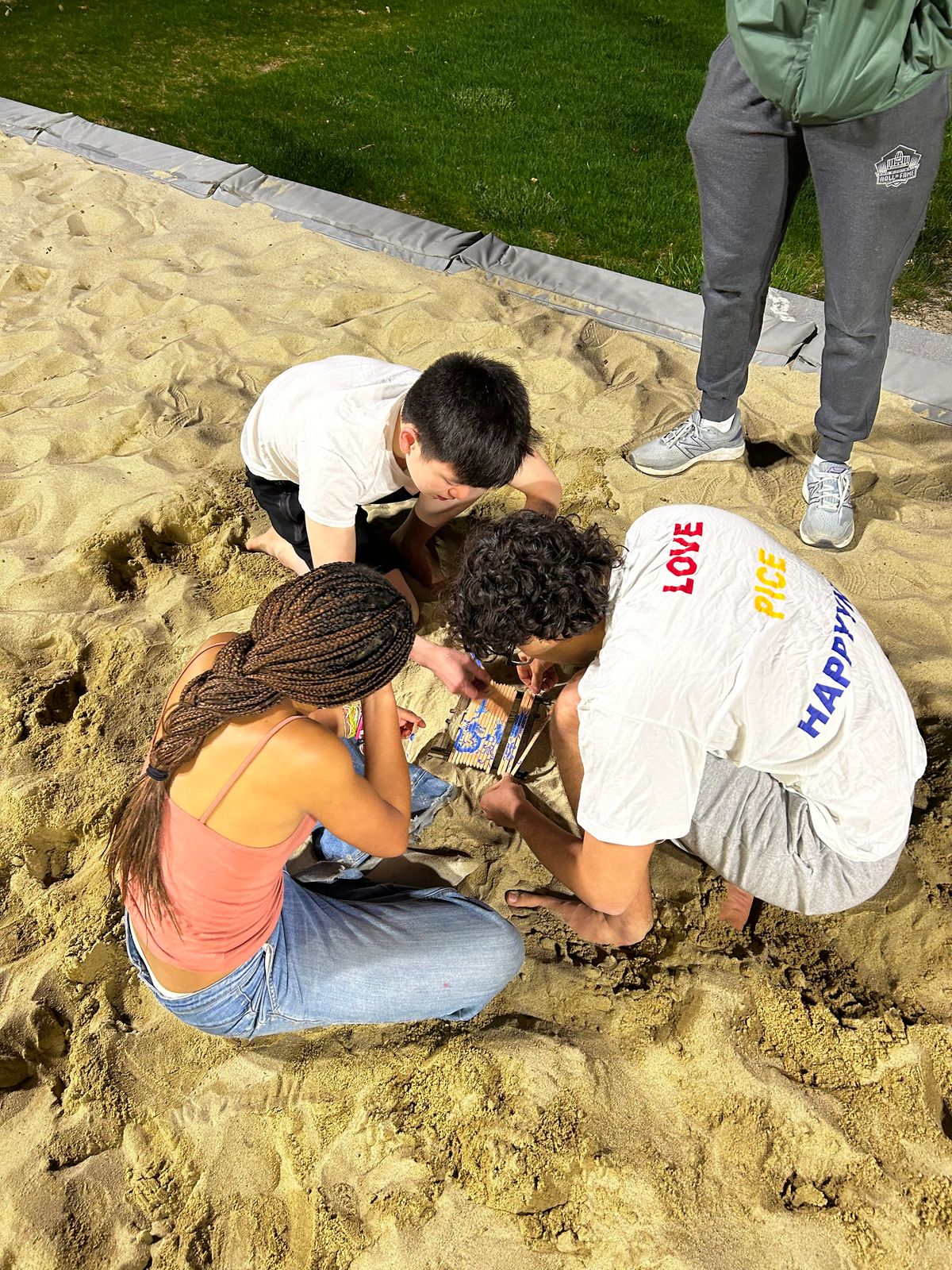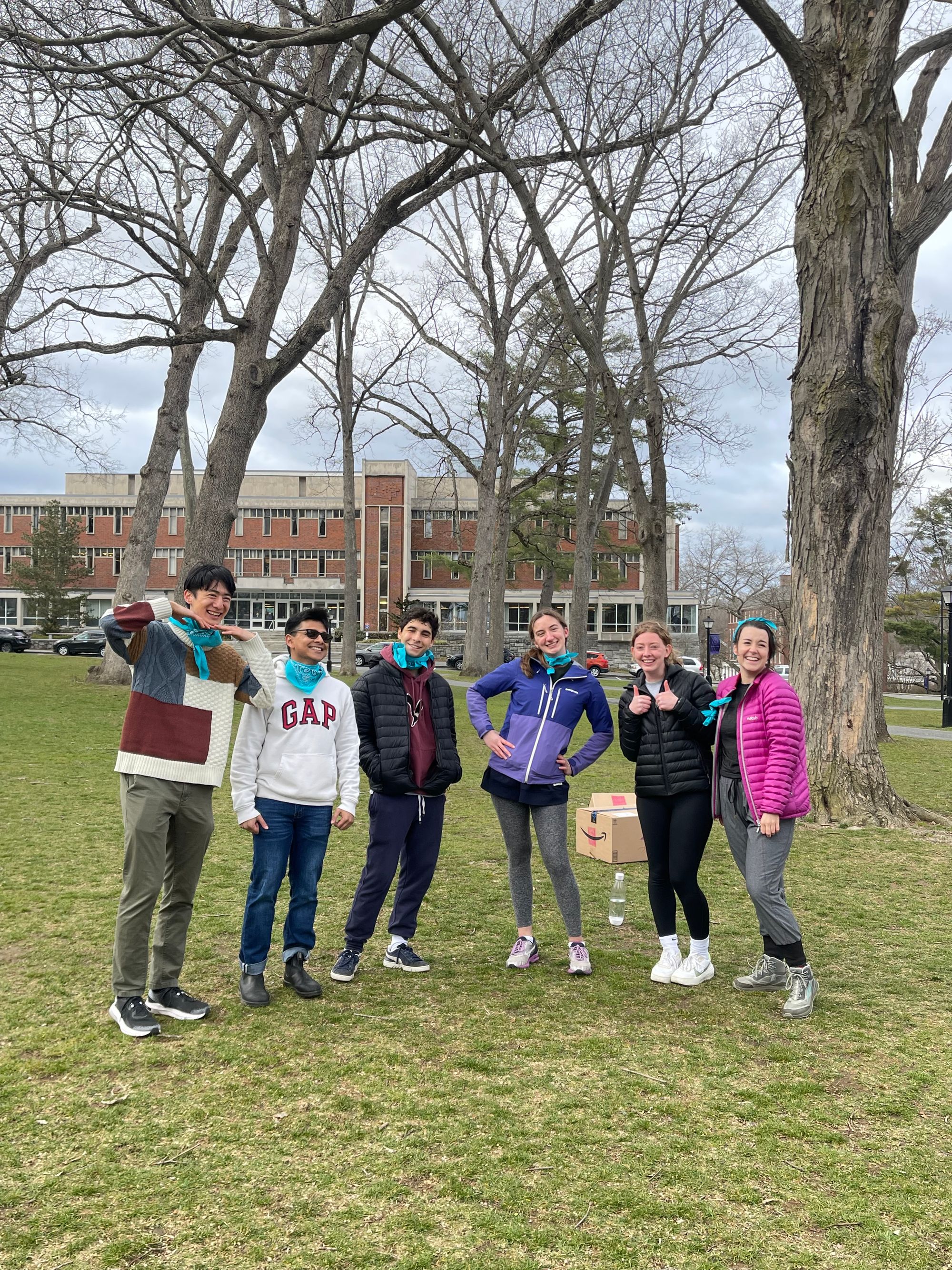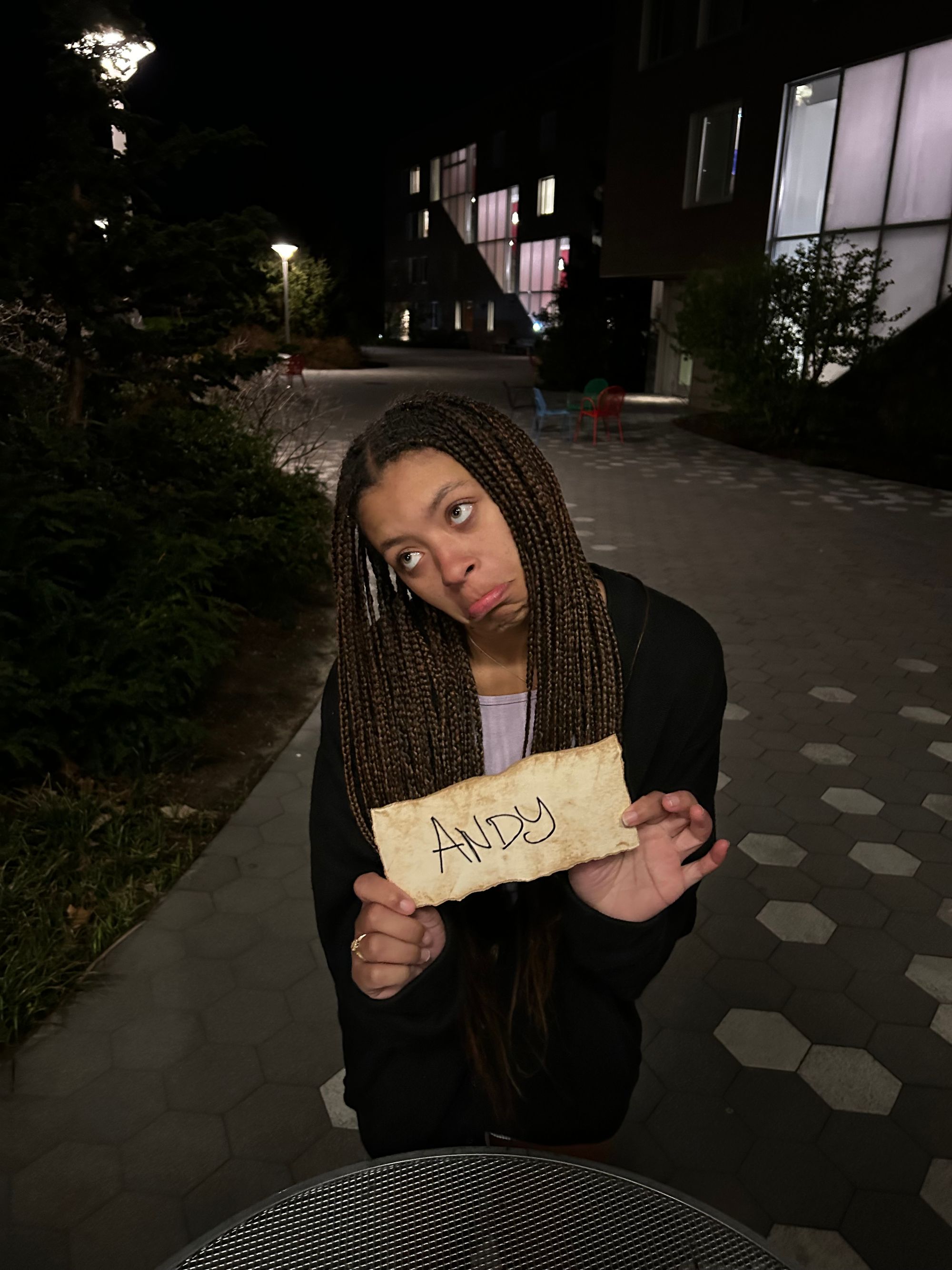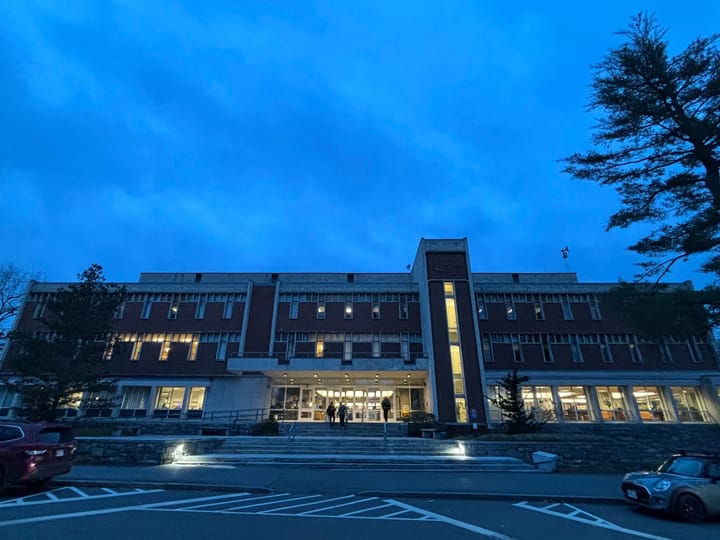Amherst Survivor: Cross-Campus Competition
Something new is sweeping campus: Amherst Survivor! Managing Features Editor June Dorsch ’27 explores how the game has been unfolding.

“Turn 90 degrees to the right. Keep going!” Tom Ye ’25 shouted. Four people walked around the First Year Quad blindfolded, giggling. It was the first challenge of Amherst Survivor, an Association of Amherst Students (AAS) initiative inspired by the reality television show Survivor.
Surprisingly, the idea for Amherst Survivor started in a place where few good things begin: Fizz.
“[Sebastian Pollock ’27] posted a question on Fizz being like, ‘Wouldn’t it be so cool if there was a Survivor game at Amherst?’” Senator Henry Pallesen ’25 explained. “So then I replied to that [and we started direct messaging on Fizz] … We were like, ‘You know who we should include in this? Vaughn [Armour ’25].’ He writes all these articles, he’s a superfan.”
Pollock and Pallesen are both AAS senators, and Pollock decided to make Amherst Survivor his Senate project. That way, they could receive funding from AAS’ Senate fund.
“He [got] decent funding … I think it was 500 [dollars],” Armour said.
They used the money to get materials for their game, including real Survivor puzzles they found on Etsy.
The television show Survivor has contestants isolated in the wilderness, where they have to work on providing food, water, and shelter for themselves along with competing in challenges to win the show. Amherst Survivor clearly would not be that extreme. While they could not organize an exact recreation, they tried to be true to the show. However, the organizers felt that the differences between the television show and their version of Survivor were actually beneficial.
“It makes it not just [a] worse [version of] Survivor. This is different … And I think leaning into that, instead of just like, trying to force it into … as much like normal Survivor, has made this better,” Armour said.
Once they had the game designed and the materials ready, they advertised the program around campus and had an application process. 18 people were selected to be in the game, and they were divided into three tribes based on what they considered their biggest strength: Charm, Might, and Reason. Armour, Pallesen, and Pollock selected a diverse cast to best represent the campus.
“People often talk about how Amherst is pretty segmented in different communities, and there’s not that much sense of wider campus community or integration between different groups,” Pallesen said. “This is just the perfect opportunity to meet people who you otherwise … just wouldn’t have any contact with.”
“We cast all four grades,” Armour said. “There [are] people in [Humphries House], there [are] people in [the] Greenways, people in central campus. Obviously, there [are] people in the freshman quad. But yeah, it’s something that expands the whole campus.”
One common trait most participants shared was that they were big fans of the actual show.
“I’ve been a fan of the show since I was eight or nine,” Mickie Webbeking ’27 said. “And I have considered applying for the real Survivor. I figured doing Amherst Survivor would be a good way to practice for the real thing, see if I’m any good at it.”

Even those who had not seen the show, like Marcus Chung ’26, knew a fair amount about how it worked. He had never watched an episode, but his best friend was a huge fan who organized Survivor games. As a result, Chung has been in other Survivor games and has gotten a lot of secondhand knowledge.
“I have a weird amount of experience for someone who’s never watched it,” Chung said.
The Game
At the time of my reporting, the original 18 contestants had been reduced to 10, and four challenges had already taken place. All the challenges were puzzle-based and located around campus, from the First Year Quad to Pratt pool. Tribes had to complete challenges in the fastest time since the two tribes with the worst times had to go to the tribal council and vote off a member (in episode four, the tribes merged to become one 12-person tribe).

All the participants I interviewed emphasized that tribal councils were where they had to be the most calculated. The two tribes that completed the challenges the slowest went to the tribal council to vote out one of their members and, as a result, the cast formed alliances and developed strategies to survive to another round.
“[My strategy was] just forming strong alliances with people, and then eventually voting out bigger threats, but not too soon,” Webbeking said. “And just trying to focus on who [I] thought [I] could trust.”
Webbeking worked with Dory Farlessyost ’24 and her closest alliance Phoebe Mugford ’25, but her strategy failed. She was eliminated in episode three after she could not participate in the previous challenge due to an injury.
The other two contestants I interviewed did not come in with a clear strategy and developed plans that were flexible and changed from episode to episode.
“I think this game is pretty unpredictable,” Andy Dinh ’27 said. “So to come in with strategy [at the beginning]? I don’t think it really would have really work[ed] out well. I sort of developed strategy as [situations unfolded]. There’s a situation and you adapt to that situation.”
Chung said the hardest part of tribal council was navigating what he called “a conspiracy.” His tribe had to go to tribal council in the second episode, and because Brendan Quiñones ’26 did not show up to the last challenge, he felt everyone was in agreement that he should be voted out.
However, he did not know Quiñones and another tribe member, Sophia Haynes ’26, were dating.
“I thought there was a weird gender divide on the team for voting. But, you know, Brendan and Sophia were actually the ones orchestrating the entire thing,” Chung said.
Eventually, after talking to Haynes before the tribal council, he decided to vote out AnLing Vera ’25 over Quiñones.
“If I was the only boy on the entire team [then] I would definitely get eliminated,” Chung realized.
Vera had lots of connections within the tribe and in the other tribes, so Chung is still worried that this was a dangerous move. However, most of the blame for that tribal council fell on Haynes, and she was the one voted out in the first tribal council when all three tribes merged.

Since that merge, Chung feels that he has no strong alliances, but hopes that can work to his advantage still.
“It allows me to play more fluidly [and] if everyone knows that I’m undecided, then they’re all going to try to talk to me and get me on their side,” Chung said.
What’s Next
As the game nears a close, contestants have predictions of who will win (the organizers also do, but they did not want to say who they think will win on the record).
“I probably want [Mugford] to win because she [was] my closest alliance,” Webbeking said. “Maybe someone from [the] Charm [tribe] … that’s my tribe.”
Chung and Dinh are both still in the game but said they did not think they would win.
Of his original tribe, the Might tribe, only he and one other tribe member remained, so Chung did not feel that he had enough alliances to make it.
“At this point, I don't really think I’m going to win because winning is unlikely in any scenario, but I’m hoping to prolong my stay in the game as long as possible and also cause drama,” Chung said.
On the other hand, while Dinh feels secure in the alliances he has made so far, he has noticed that people keep on voting for him even if he has not been eliminated yet.
“I don’t really know why people want me out,” Dinh said. “I don’t know if they see me as a threat, or [it’s because] I haven’t talked to them and made those connections.”
Dinh hopes that either he or his alliance Ari Dengler ’24 win the game.
After the game ends, Amherst Survivor is not over. Armour, Pallesen, and Pollock have been recording the challenges and plan on creating a video of the season over the summer. They also want to do more seasons of Amherst Survivor and expand its role on campus.
“We’re gonna work to transition this from [a] Senate project-oriented thing, towards [being a Registered Student Organization],” Pallesen said.
“People see [Amherst Survivor] and they’re like, ‘Okay, Amherst isn’t all just getting stressed about exams, professional stuff.’ We’re just taking the time to do something that we love and I think people respect that,” Armour said. “[That’s why] we want to make this more of a thing.”





Comments ()